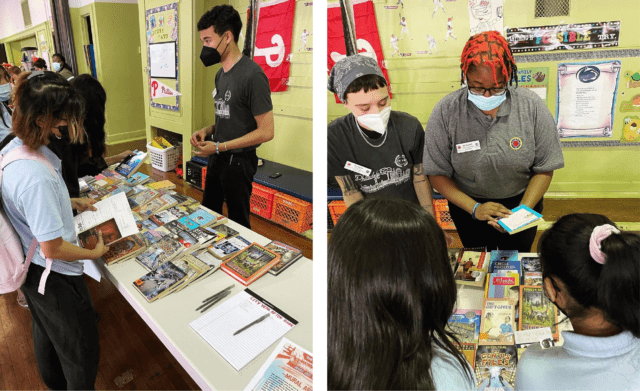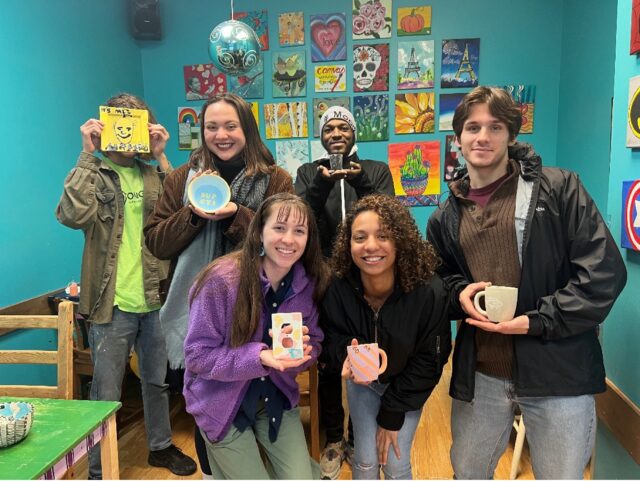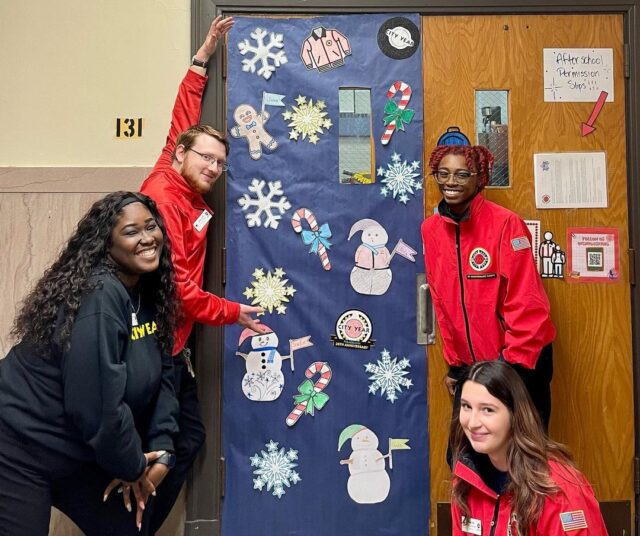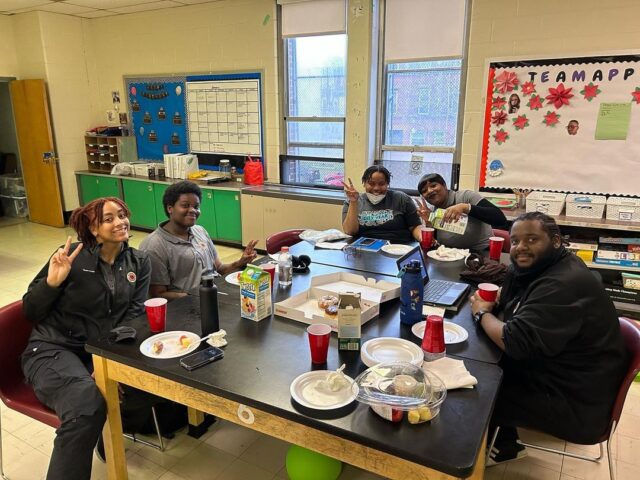City Year 101: Literacy Tutoring
This blog was updated in January 2024 to reflect the School District of Philadelphia’s changing literacy curriculum.

AmeriCorps members at Southwark School host a free book fair to instill a love of reading in students.
In this ongoing blog series, we are taking a deep dive into the range of City Year Philadelphia’s (CYP’s) work in schools, including social-emotional learning, literacy and math tutoring, afterschool programs, and school-wide events.
Our first blog explored social emotional learning (SEL) and its importance in building a foundation of trust and respect with students before working on academics. In this next installment, we’re diving into literacy tutoring. Stay tuned for future blogs to learn more about how our AmeriCorps members, serving as Student Success Coaches, are supporting student achievement in and out of the classroom.
Literacy Tutoring: What It Is and How It Works
Literacy tutoring sessions start when a student is identified as needing additional academic support. City Year examines school-provided data on student grades and test scores, assigning AmeriCorps members a “focus list” of students with whom they work closely throughout the school year.
The School District of Philadelphia is implementing broad changes to its literacy curriculum, adopting literacy strategies that promote the science of reading and structured literacy. A new district-wide curriculum will be launching in the 2024-25 school year. Consequently, CYP’s Corps members are being trained in new literacy tutoring approaches that align with these changes.
In both K-8 and high school settings, Corps members dedicate a minimum of 60 minutes per week to work with their focus list students, either individually or in small groups. It is important to note that these tutoring sessions may vary based on the ages and learning needs of the students. For grades 3-8, CYP Corps members focus on vocabulary acquisition and reading fluency strategies that complement the classroom text. In high school settings, rather than adhering to a fixed curriculum, Corps members work with students on reading comprehension and writing strategies to develop skills necessary for high school and beyond. The ultimate goal is for students to eventually be able to perform this work independently without the support of a Corps member.
City Year partner schools navigate a number of real challenges. Among them, the schools experience systemic under-resourcing, and they often need more caring adults in the buildings to aid student learning. Given the learning interruptions caused by the pandemic, many Philadelphia students can benefit from extra support to achieve reading proficiency at grade level.
While 15% of fourth graders and 17% of eighth graders in School District of Philadelphia are reading at grade level (National Assessment of Education Progress, 2022), City Year Corps members provide schools with needed personnel, both in the classroom and in tutoring spaces, to bolster student learning and academic achievement.
Stories from our Corps
Success in literacy might seem small at first, but over time it can ripple into substantial life outcomes for students. Four of CYP’s 2022-23 AmeriCorps members—Lucy Flattery-Vickness, Anaya Artopee, Olivia Baptiste, and Candus Burks—share their experiences supporting students in literacy.
Lucy Flattery-Vickness, Team Leader at Kensington High School, shared a story about supporting one of her former students in completing a 1,500-word personal essay assignment. The student sometimes struggled with staying motivated to complete his work, and he expressed to Lucy that the assignment felt like an overwhelming task. Not only was this the longest essay the student had ever written, but the prompt also required him to revisit some difficult life experiences. Despite being given the option to write about other aspects of his life, the student chose to take the more challenging route. With Lucy’s encouragement and support, the student persevered through the writing process, taking breaks when he needed to talk through his feelings before continuing.
By the time the deadline was nearing, Lucy was starting to get nervous, as the student still had an additional 500 words left to write. On the Monday the essay was due, the student came into school with a big smile on his face. He couldn’t wait to tell Lucy how he had worked hard throughout the entire weekend to complete his essay. Lucy shares, “This was an amazing moment for this student, because I could tell that he had proven to himself that he could do work independently. Moreover, I could tell that he was sincerely proud of himself, which was the biggest win of all.”
“This was an amazing moment for this student, because I could tell that he had proven to himself that he could do work independently. Moreover, I could tell that he was sincerely proud of himself, which was the biggest win of all.” -Lucy Flattery-Vickness, Team Leader at Kensington High School

Lucy (bottom left, purple jacket) with her team at Kensington High School.
Anaya Artopee, Team Leader at Lewis C. Cassidy Academics Plus, spoke about a student with whom she worked last year. The student began the year reluctant to engage in class. He kept his head down and was hesitant to speak up when he needed help. Anaya’s literacy tutoring sessions provided the student with a safe space to ask questions and gain the confidence needed to engage in his learning.
Anaya explains, “In my tutoring sessions, I use guiding questions to help students connect the reading to things they already know. He began to thrive in those spaces once he realized he already knew a lot more than he thought.” The tutoring sessions additionally helped the student become more confident with sounding out new words; whenever the student began to doubt himself, Anaya would offer reassurance and encouragement. The student gradually gained confidence in attempting the words on his own, and he began participating much more frequently in both Anaya’s tutoring sessions and the larger classroom.

Anaya (pictured left) with her Cassidy School teammates at the start of the service year.
Olivia Baptiste, Team Leader at Roxborough High School spoke about how the literacy sessions impacted her 9th grade students. During one session, the students were asked about a metaphor in their text. In class, the students were struggling with grasping the concept of similes and metaphors. In listening to her students’ conversations, it dawned on Olivia that her students were already using similes and metaphors all the time through their use of slang. By breaking down the concept in a relatable way, Olivia was able to support her students in building their literacy skills.

Olivia (pictured right, standing) and her Roxborough High School teammates show off their City Year-themed winter door decor.
Candus Burks, Team Leader at Duckrey School, likewise saw success in her literacy sessions when she adjusted her lesson plans to meet students’ interests and needs. For example, Candus noticed that her students struggled with independent writing time. She observed that students had an easier time with writing when they were able to talk about it first; as a result, she began incorporating group discussion time at the start of each lesson to ease students into their independent work.
Candus also added games and interactive activities into her tutoring sessions to make the sessions more fun and engaging—such as warming up with a few silly “Would you rather?” questions, asking students to share their ideas through Think-Pair-Shares, and playing word games like “Bananagrams” as an incentive for completing a lesson.
Candus spoke about one student who was very shy and reserved at the beginning of the school year. She rarely engaged with the reading materials or participated during group discussions. Through these various engagement activities that Candus incorporated into her sessions, she noticed a drastic change in the student’s attitude towards reading throughout the year, from reluctant to enthusiastic. The student additionally became more comfortable participating in group discussions and answering questions. Candus explains that, when working with students, “It’s the little, little wins. It’s never the huge things you see right away.”
“It’s the little, little wins. It’s never the huge things you see right away.” -Candus Burks, Team Leader at Duckrey School

Candus (pictured far left) enjoying some teambuilding time with the Corps members at Duckrey School.
Stay tuned for our next blog in this series, as we explore math interventions and tutoring!
Are you considering a year of service, or do you know someone who is? Learn more about how you can serve as a full-time mentor and tutor with City Year Philly. Click below to start your journey.
Related stories
Student Success Coach Riya Sembhi (pictured front row, right, with her Sullivan Elementary team) shares her experiences serving a gap...
Read more about My Gap Year with City Year PhiladelphiaLeft: Hanna during her time serving as a City Year Philadelphia AmeriCorps member, 2019-2020. Right: Hanna in her current role...
Read more about Alumni Spotlight: Hanna Kim (‘20), Community Schools Volunteer Coordinator, City of PhiladelphiaPhiladelphia City Council President Kenyatta Johnson (pictured center, gray suit) is joined by leaders of local youth-serving organizations—including CYP Executive...
Read more about Spotlight on Kenyatta Johnson, City Year Philly’s 2024 Idealist of the YearIf you speak with an HBCU alum about their experience, you’ll quickly learn that service to the community is one...
Read more about Diversity, leadership and community: reflections of an HBCU alum















